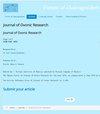Structural and electronic properties of PANI-ZnO-TiO2 nanocomposite
IF 1
4区 材料科学
引用次数: 0
Abstract
The nanocomposites of doped Polyaniline (PANI) with ZnO-TiO2 nanoparticles have been prepared by in-situ polymerization method. The structural properties of synthesized PANI and PANI/ZnO-TiO2 were studied by X-ray diffraction (XRD) analysis. XRD pattern show that PANI is intercalated into the layers of ZnO-TiO2 successfully and thus the degree of crystallinity increases due to crystalline nature of ZnO-TiO2. FTIR analysis indicated that there is a strong interaction between ZnO-TiO2 nanoparticles and PANI. Electronic properties (Dielectric and Conductivity) of PANI and PANI/ZnO-TiO2 nanocomposite have been investigated between frequency ranges from 20Hz to 01MHz, higher dielectric constants and dielectric losses of PANI/ZnO-TiO2 nanocomposites were found. As the content of ZnO-TiO2 increased, the dielectric constant and loss also increased. The value of dielectric constant for all samples is very high at low frequency but decreases with increase in frequency. Synthesis of PANI/ZnO-TiO2 nanocomposite materials with a large dielectric constant is promising for charge storage devices applicationsPANI-ZnO-TiO2纳米复合材料的结构和电子性能
采用原位聚合法制备了掺杂聚苯胺(PANI)与ZnO-TiO2纳米颗粒的纳米复合材料。通过X射线衍射(XRD)分析,研究了合成的PANI和PANI/ZnO-TiO2的结构性能。XRD图谱显示PANI成功地嵌入到ZnO-TiO2层中,因此由于ZnO-TiO2的结晶性质,结晶度增加。FTIR分析表明,ZnO-TiO2纳米粒子与聚苯胺之间存在强烈的相互作用。研究了PANI和PANI/ZnO-TiO2纳米复合材料在20Hz至01MHz频率范围内的电子性能(介电和电导率),发现PANI/ZnO-TiO2纳米复合物具有较高的介电常数和介电损耗。随着ZnO-TiO2含量的增加,介电常数和损耗也增加。所有样品的介电常数值在低频时都很高,但随着频率的增加而降低。具有大介电常数的PANI/ZnO-TiO2纳米复合材料的合成对电荷存储器件的应用前景广阔
本文章由计算机程序翻译,如有差异,请以英文原文为准。
求助全文
约1分钟内获得全文
求助全文
来源期刊

Journal of Ovonic Research
Materials Science-Electronic, Optical and Magnetic Materials
CiteScore
1.60
自引率
20.00%
发文量
77
期刊介绍:
Journal of Ovonic Research (JOR) appears with six issues per year and is open to the reviews, papers, short communications and breakings news inserted as Short Notes, in the field of ovonic (mainly chalcogenide) materials for memories, smart materials based on ovonic materials (combinations of various elements including chalcogenides), materials with nano-structures based on various alloys, as well as semiconducting materials and alloys based on amorphous silicon, germanium, carbon in their various nanostructured forms, either simple or doped/alloyed with hydrogen, fluorine, chlorine and other elements of high interest for applications in electronics and optoelectronics. Papers on minerals with possible applications in electronics and optoelectronics are encouraged.
 求助内容:
求助内容: 应助结果提醒方式:
应助结果提醒方式:


